The Hidden Truth: Can Shoes Cause Knee Pain?
Have you ever wondered, “Can shoes cause knee pain?” If this thought has crossed your mind, you’re not alone. As a chiropractor and someone who’s experienced knee pain, I can tell you that footwear indeed plays a significant role in knee health. This article will take you on an enlightening journey exploring how your shoes can either be the culprit behind your knee pain or your ally in maintaining knee health.
Table of Contents
Introduction: Can Shoes Really Cause Knee Pain?
In our daily lives, we tend to overlook the importance of choosing the right shoes. We often give preference to style over comfort, unaware of the long-term impact on our knees. Unbeknownst to many, the wrong shoes can lead to discomfort, pain, and even severe knee injuries.
This article aims to shed light on the relationship between footwear and knee pain. By the end, you’ll understand why it’s essential to think twice before slipping on those stylish but uncomfortable shoes. But before we delve into that, let’s first understand the anatomy of the foot and knee.
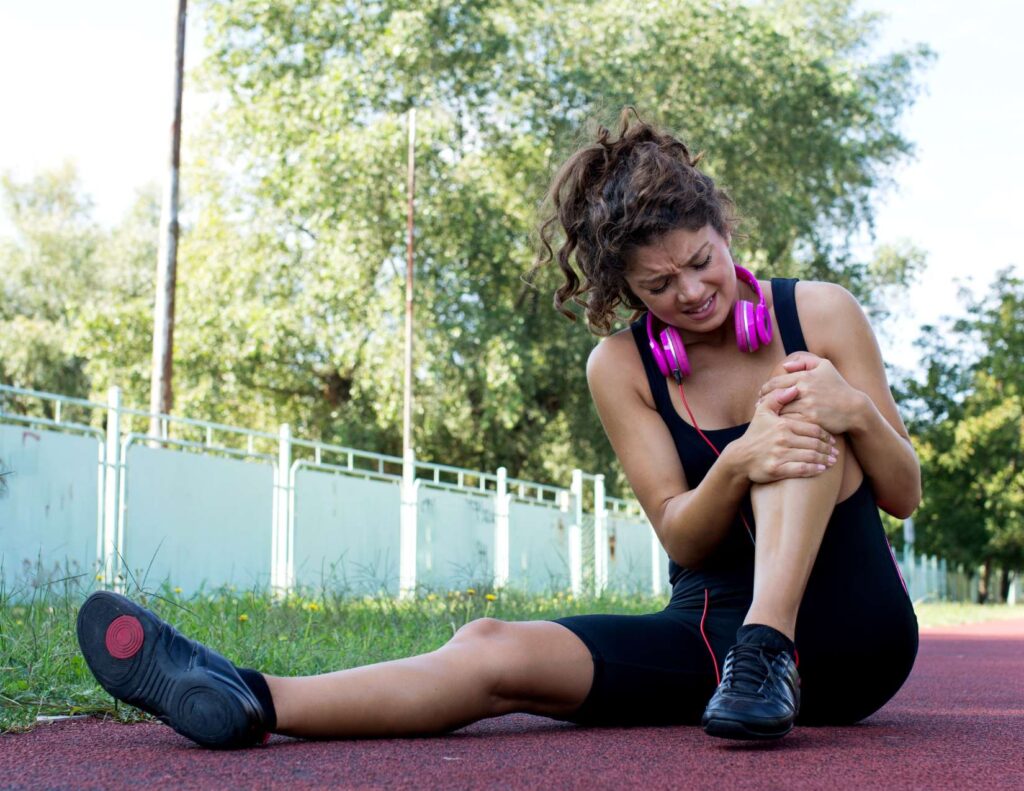
The Anatomy of The Foot and Knee
The human foot is a complex structure consisting of 26 bones, 33 joints, and over a hundred muscles, tendons, and ligaments. It’s designed to bear weight, adapt to various surfaces, and absorb shock. Every step we take initiates a chain of events starting from the foot and moving up to the knee, hip, and the rest of the body.
The knee, on the other hand, is the largest joint in the body. It’s a hinge joint that allows the leg to bend and straighten, facilitating movements like walking, running, and jumping. It’s also incredibly susceptible to stress and strain due to its weight-bearing nature.
Understanding the intricacies of these two structures is crucial to appreciating how footwear can influence knee health. Let’s delve deeper into this relationship in the next section.
Understanding the Relationship Between Footwear and Knee Pain
The type of shoe you wear affects your foot’s alignment, which in turn influences your gait (the way you walk or run). An abnormal gait can lead to an uneven distribution of weight, causing excessive stress on the knee joints. Over time, this stress can cause knee problems and potentially lead to conditions like osteoarthritis.
For instance, shoes with inadequate arch support can lead to flat feet or overpronation, where your feet roll inward excessively. This malalignment can strain the knee, causing pain and discomfort.
Now that we have a basic understanding of how shoes can cause knee pain, let’s examine how different types of shoes contribute to this problem.
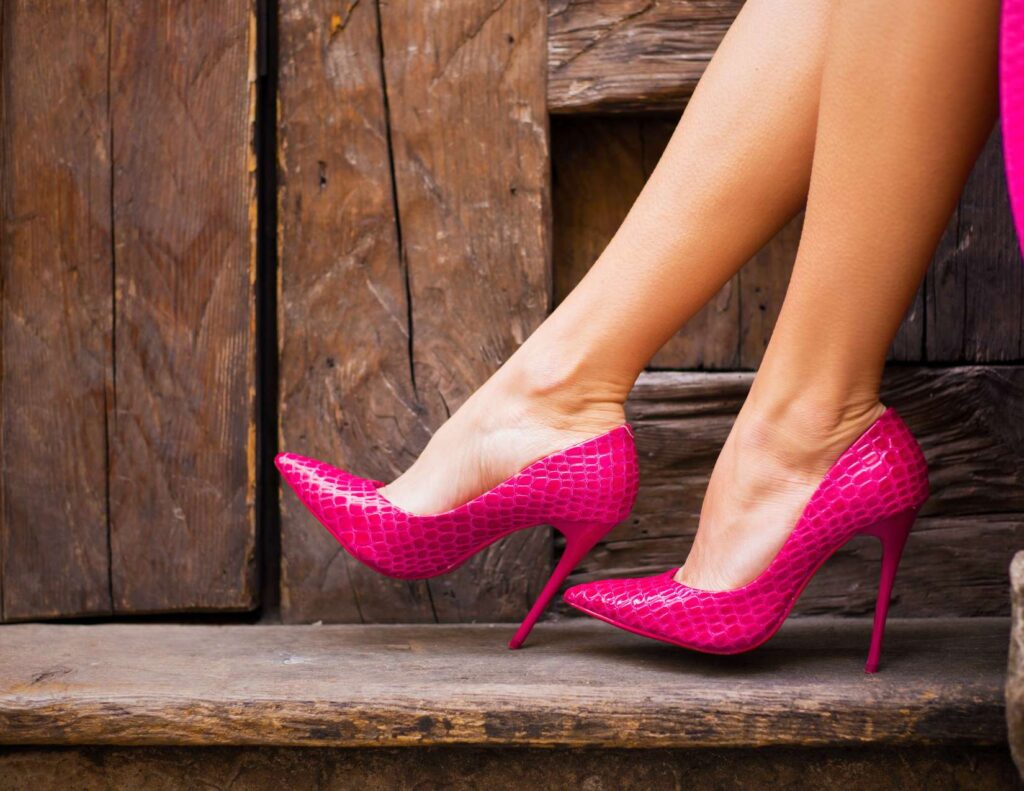
How Different Types of Shoes Can Cause Knee Pain
Not all shoes are created equal when it comes to knee health. The wrong kind of shoes can lead to knee pain and problems. While the right kind of shoes can help alleviate them. Here, we’ll look at a few common types of shoes and their impact on knee health.
The Impact of High Heels on Knee Health
High heels are a perfect example of style over comfort. While they might make you feel elegant and stylish, their impact on your knee health is far from glamorous. High heels elevate the heel, causing an unnatural alignment of the foot. This unnatural position increases pressure on the knees, leading to pain and discomfort.
Moreover, high-heeled shoes restrict the natural movement of the foot, forcing it to adapt to a compromised position. This adaptation can strain the knee joints, potentially leading to long-term problems such as knee osteoarthritis. They are also a major cause of foot pain (no surprise!).
The best way to start is to take a look at the heel height of your shoes. It would be a good choice to go for shorter heels, especially if you plan to wear them for more than a few hours.
The Role of Athletic Shoes in Preventing or Causing Knee Pain
On the flip side, athletic shoes are designed to support and protect your feet during physical activities. However, not all athletic shoes are created equal. Some might not provide adequate support or cushioning, leading to stress on the knee joint.
However, wearing worn-out athletic shoes can also cause knee pain. Over time, the cushioning of these shoes wears down, decreasing their shock-absorbing capability. This lack of cushioning can increase the impact on the knee joints, leading to pain and discomfort.
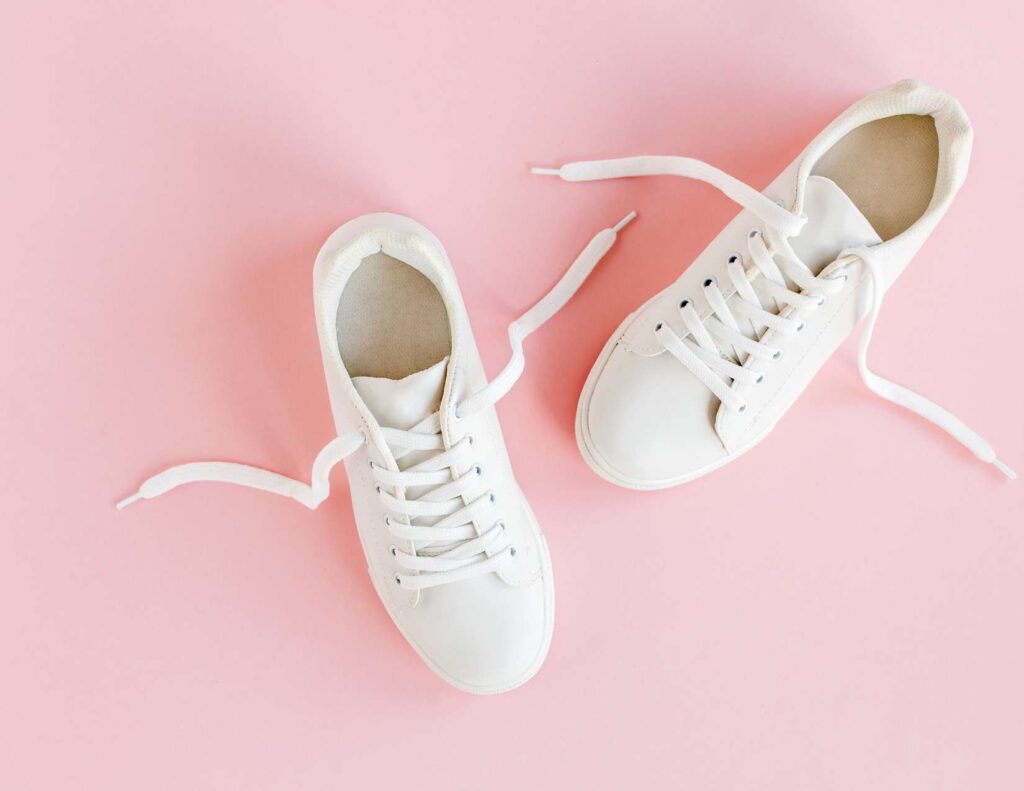
Choosing the Right Footwear to Prevent Knee Pain
Having explored how different types of shoes can impact knee health, it’s clear that choosing proper shoes is crucial. But what does the ‘right’ footwear look like?
Firstly, the right footwear should provide proper arch support to prevent overpronation (flat feet) or underpronation (high arches). It should also have extra cushioning to absorb shock, reducing the impact on the knee joints. Flat shoes, like flip flops, can lead to joint pain. A flexible sole is also important – a shoe that can flex with the movement of your body will be more comfortable and reduce pain.
A great option for a walking shoe will also have a wide toe box to promote natural foot movement. Toe gripping or squeezing is uncomfortable, and can cause pain around the knee joints if worn for long periods of time.
Moreover, the best shoes for YOU should fit well. Shoes that are too tight can cause discomfort and alter your gait, while shoes that are too loose can cause instability, both of which can lead to knee pain.
Can shoes cause knee pain? What Chiropractors Say About Shoes and Knee Pain
Chiropractors, like me 🙂 who specialize in the diagnosis and treatment of musculoskeletal disorders, often stress the importance of proper footwear in maintaining knee health and joint health. They will argue that shoes can indeed cause knee pain, especially those that do not support the natural alignment and movement of the foot.
Shoes also have an impact on the general health of the foot. Conditions such as heel pain, plantar fasciitis and bunions can arise. The wrong shoe choices can also lead to sciatica, back pain, tight calf muscles and neck pain.
The takeaway here is that you should choose the kinds of shoes based on fit and comfort, not just fashion or style. Take some time to find shoes that provide arch and ankle support, cushioning for shock absorption and a snug but flexible.
They recommend opting for supportive shoes that provide good arch support, have adequate cushioning, and fit well. Furthermore, they advise against wearing high heels for extended periods and suggest replacing worn-out athletic shoes regularly.
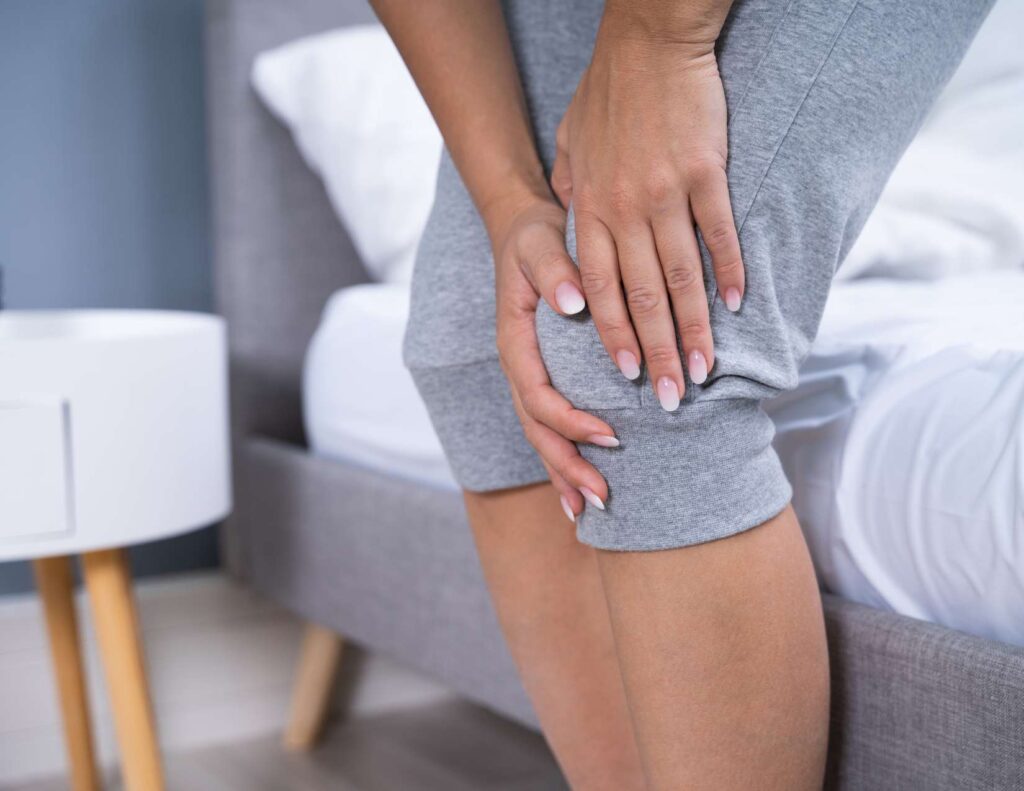
How to Alleviate Knee Pain Caused by Footwear
If you suspect that your ill-fitting shoes are causing your knee pain, the first step is to switch to more supportive and comfortable footwear. However, if the pain persists, it’s essential to seek professional help. A healthcare professional, such as a physical therapist, can diagnose the issue and provide appropriate treatment. It may include physical therapy, pain-relief medication, or in some cases, surgery.
Additionally, regular exercise can strengthen the muscles around the knee, providing better support and reducing the risk of injury for the entire body. Incorporating low-impact activities like swimming or cycling can also help alleviate knee pain. It’s important to avoid hard surfaces without proper cushioning, as well as repetitive or high-impact movements.
Conclusion: The Importance of Choosing the Right Footwear for Knee Health
In conclusion, the answer to the question, “Can shoes cause knee pain?” is a resounding yes. Your footwear can significantly impact your knee health, either positively or negatively. By choosing the right shoes, you can prevent knee pain and ensure the longevity of your knee health.
Remember, while style is important, it should never compromise your comfort and health. So the next time you’re shoe shopping, make sure to prioritize support, comfort, and fit over style. Your knees will thank you for it!

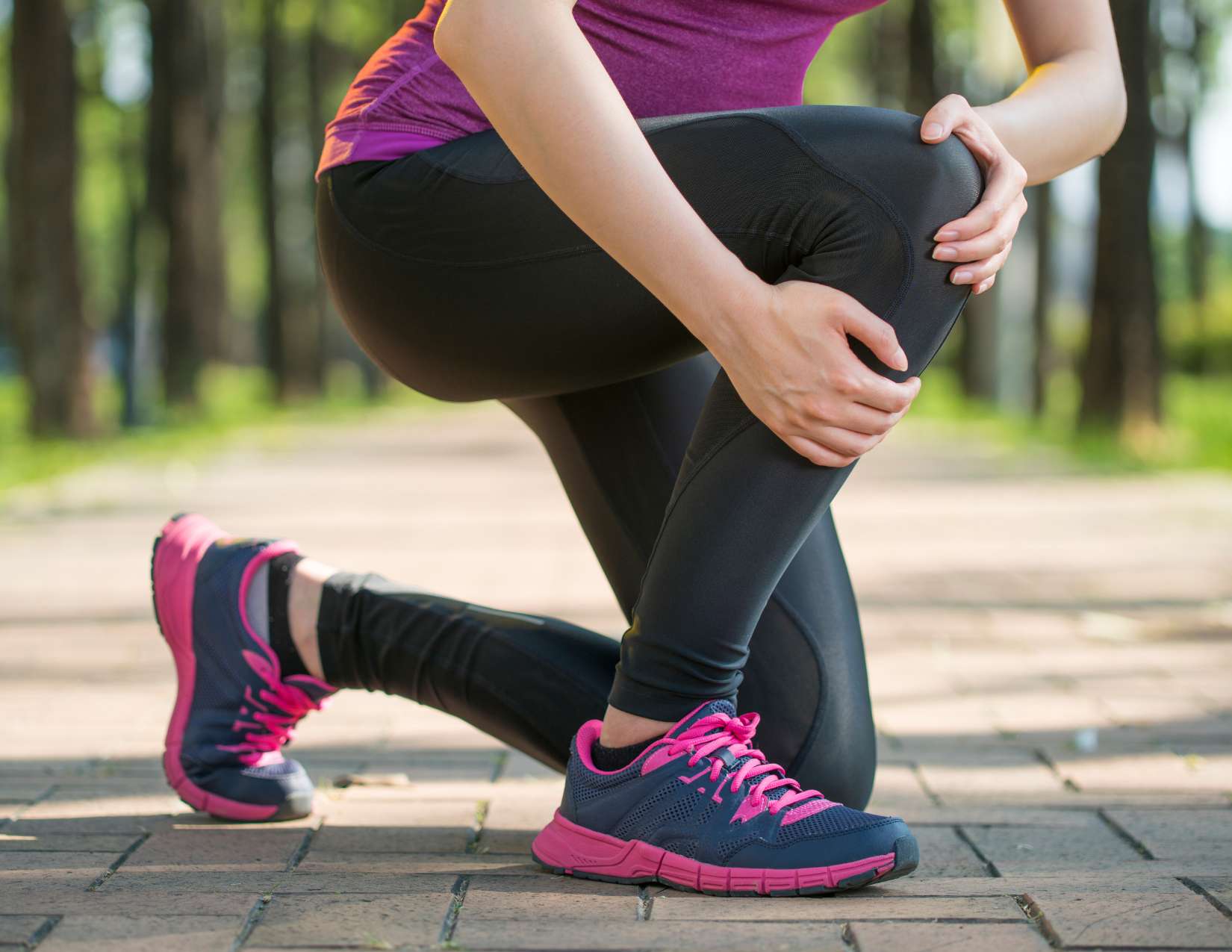






One Comment
Comments are closed.